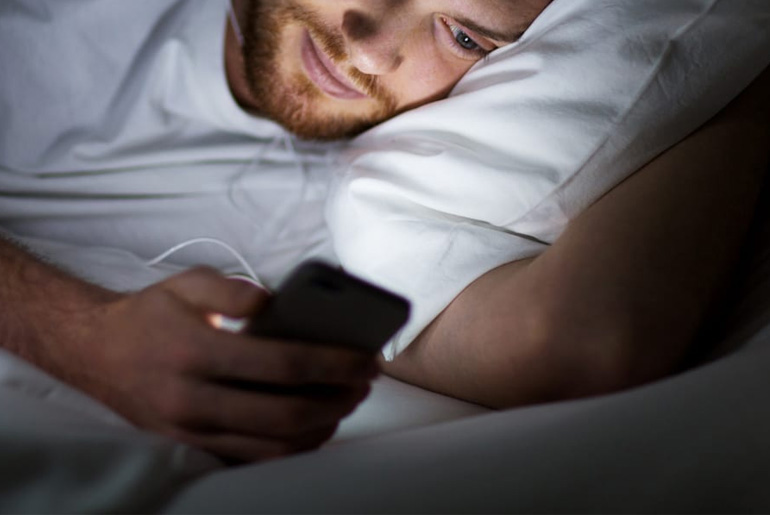The influence of social media and screen use on youth mental health and sleep quality has become a significant concern, prompting the US Surgeon General to suggest a warning label for social media platforms. The Surgeon General’s Advisory on social media and Youth Mental Health highlights the connection between social media use and poor sleep quality in adolescents. To address these issues, specific measures can be implemented by teenagers and parents to enhance sleep quality.
“Ensuring adolescents get enough sleep is vital, as it supports their physical and mental growth and development,” states lead author Jason Nagata, MD, associate professor of pediatrics at the University of California, San Francisco. “Our research found that leaving notifications on, even in silent mode, leads to less sleep compared to turning the phone off completely or keeping it outside the bedroom.”
Key Measures to Enhance Sleep Quality:
- Keep Screens Outside of the Bedroom:
Avoid placing TVs or internet-connected devices in bedrooms: The presence of these devices in the bedroom is linked to shorter sleep duration. Removing them can help create a sleep-friendly environment.
- Turn Off the Phone Completely:
Avoid using the phone in the bedroom: Turning off the phone entirely, rather than just setting it to silent or vibrate, can significantly reduce sleep disturbances. Adolescents who leave their phone ringers on face a 25% higher risk of sleep disturbance.
- Avoid Using Electronic Devices Before Bed:
Restrict social media and electronic device usage before sleep: Activities such as using social media, chatting online, playing video games, browsing the internet, and watching or streaming videos while in bed are all associated with reduced sleep quality. Establishing a no-screen policy before bedtime can help improve sleep duration and quality.
- Refrain from Using Devices If Waking Up During the Night:
Do not engage with electronic devices if you wake up during the night: Approximately 20% of adolescents reported using their phone or other devices after waking up at night, which is linked to less overall sleep. Encouraging adolescents to avoid screen use during nighttime awakenings can promote better sleep.
Study Insights:
- Data Source: The findings are based on the analysis of data from 9,398 preteens aged 11-12, who are part of the Adolescent Brain Cognitive Development (ABCD) Study. This study is the largest long-term study of brain development and child health in the United States, with data collected from 2018-2021.
- Sleep Habits and Screen Use: Adolescents and their parents provided information on sleep habits, and youth reported their screen and social media use at bedtime.
- Prevalence of Sleep Disturbance: A quarter of preteens experienced sleep disturbances. Specifically, 16.2% reported being woken up by phone calls, text messages, or emails at least once in the past week, and 19.3% used their phone or another device if they woke up overnight.
Recommendations for Parents and Teenagers:
- Create a Bedtime Routine: Establish a consistent bedtime routine that excludes screen time at least an hour before sleep.
- Designate Tech-Free Zones: Make bedrooms tech-free zones to reinforce the association between the bedroom and sleep.
Encourage Alternative Relaxation Methods: Promote activities such as reading a book, listening to soothing music, or practicing relaxation techniques before bed.
- Educate on the Importance of Sleep: Raise awareness about the critical role of sleep in overall health and well-being, emphasizing the impact of screen use on sleep quality.
By implementing these measures, parents and teenagers can work together to foster healthier sleep habits and mitigate the negative effects of social media and screen use on sleep quality and mental health.
“Adolescents can be extremely sensitive to phone notifications, often waking up instantly when they hear their phone,” stated Nagata. “Even if a phone is on silent or vibrate, adolescents may still check it overnight. Once they start reading or responding to messages, they can become more alert and activated.”
“Adolescent development is a challenging time for many given the social pressures and physical, psychological, and emotional changes that occur,” stated co-author, Kyle T. Ganson, PhD, assistant professor at the University of Toronto’s Factor-Inwentash Faculty of Social Work. “Understanding this process and being present to support youth in their social media use is crucial.”
Disclaimer:
The information contained in this article is for educational and informational purposes only and is not intended as a health advice. We would ask you to consult a qualified professional or medical expert to gain additional knowledge before you choose to consume any product or perform any exercise.







